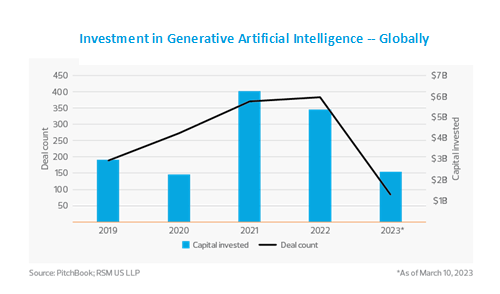Media and Entertainment Industry Needs to Prepare for Generative AI Disruption or Risk Falling Behind

The contributions of mid-20th-century mathematician and code breaker Alan Turing to artificial intelligence remain an inspiration today. Turing's 1950 research paper produced at the University of Manchester, "Computing Machinery and Intelligence," set a standard for AI development. The Turing test, commonly known as "the imitation game," is widely considered a benchmark for measuring the success of artificial intelligence. The test -- which evaluates the ability of a computer to participate in written dialogue with a human -- determines whether machines can demonstrate intelligence on par with human response.
In an incredible milestone, Google's chatbot system passed the Turing test in June 2022. Since then, another generative AI system -- ChatGPT -- has also succeeded at displaying human levels of insight. These feats mark a major leap forward for AI technology and have ushered in endless opportunities to explore what machines can do for a variety of industries.
Though still far from perfect, generative AI technologies have the potential to revolutionize many industries, including media and entertainment. Already this industry has deployed these technologies in creative processes ranging from generating first drafts of TV scripts to helping customize digital content for individual users. Companies must be aware of the potential impact of AI on their business, strive to understand its implications, and seek out ways to leverage it for their own benefit.
Implications for Content Creation
In its truest form, generative AI differs from other forms of AI because it generates new content instead of analyzing and categorizing existing material. The technology empowers creators to produce highly personalized content that can effectively engage a target audience. The impact of generative AI on content creation is profound, unlocking new possibilities for streamlining workflows, reducing costs and enhancing the overall quality of output.
For middle market media and entertainment companies, the use of generative AI for content creation presents both significant opportunities and serious threats. On one hand, if adopted intentionally and leveraged intelligently, it can elevate a company's ability to compete on a much larger stage. On the other hand, if the vision is unclear to the workforce, the adoption strategy is not well-prepared or executed, or if the emerging technology is ignored completely, it has the potential to pose an existential threat.
Investors are increasingly recognizing the opportunities presented by generative AI. In just the first 70 days of 2023, global investment by private equity and venture capital in generative AI reached $2.38 billion and is on pace to exceed 2022's total investment of $5.3 billion. Of those invested companies, 16 reached unicorn status, although some had exceeded the $1 billion valuation prior to their most recent financing.

Use Cases
Generative AI offers new tools for creators to craft storylines, build characters, develop experiences and overall streamline the creative development process. Furthermore, AI-powered tools can analyze massive amounts of data to provide insights into audience preferences, enabling creators to develop content that resonates with their target audiences across film, TV and publishing.
With the development of tools like Dramatron, by Alphabet's DeepMind, writers can generate first drafts of storylines and scripts with the assistance of generative AI, speeding the content creation process and increasing output. Although the use of AI in content creation is still a relatively new concept, its applications are already seen in the TV industry; for instance, the 24th season of the animated series South Park used AI technology for production.
The use of generative AI in post-production can also improve efficiency and cut editing costs. Hollywood director Scott Mann is a co-founder of Flawless, a company using generative AI to make hyper-realistic changes to filmed content by dubbing different languages seamlessly. The technology adjusts an actor's mouth movements to match the language overlay, resulting in a more natural and realistic dubbed version. Another technology, Metaphysic, utilizes generative AI to make actors appear younger.
BuzzFeed uses generative AI to attract and retain users by creating more personalized content. The digital media company recently announced plans to collaborate with Open AI, the developer of ChatGPT, to further personalize BuzzFeed's successful online quizzes, which received over one billion views in 2022.
Looking Forward
Implementing a new comprehensive AI strategy involves defining business objectives, identifying use cases and deploying the technology. Even though this process may be time-consuming and costly, these challenges are often offset by several positive outcomes, including:
- Improved efficiency: Automation of aspects of content creation
- Cost savings: Reduction in labor costs
- Competitive advantage: The ability to produce more personalized content than competitors
- Improved content: Higher-quality output to attract and retain customers
As AI technologies become increasingly accessible, middle market companies can join larger corporations in capitalizing on the benefits.
A longer version of this article was originally published in June by RSM US.
This article was written by Justin Krieger, RSM Canada technology, media and telecommunications senior analyst.
Click the social buttons to share this story with colleagues and friends.
The opinions expressed here are the author's views and do not necessarily represent the views of MediaVillage.org/MyersBizNet.

